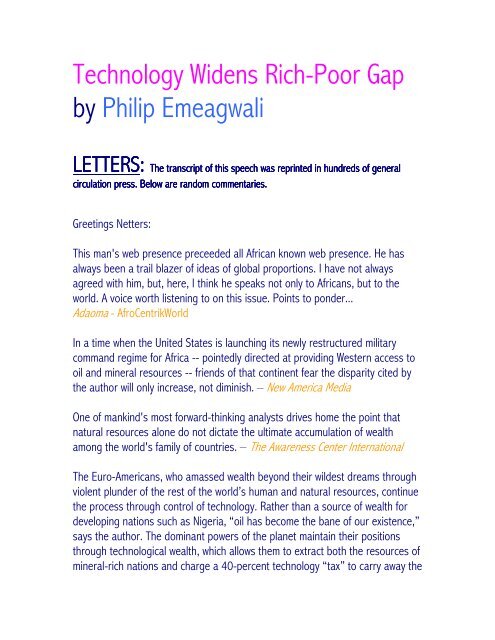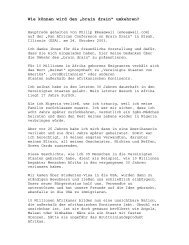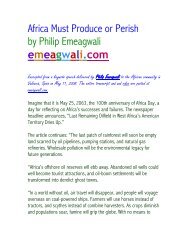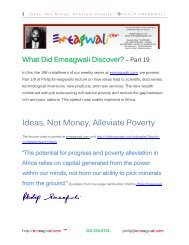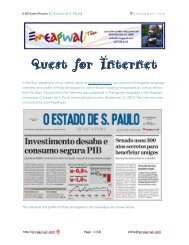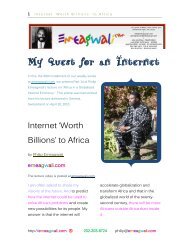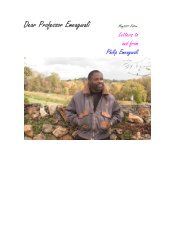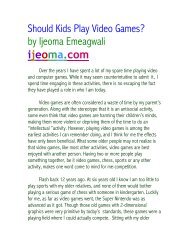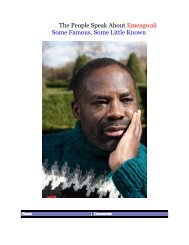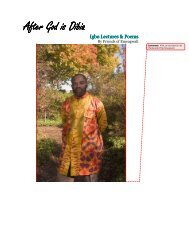Technology Widens Rich-Poor Gap by Philip Emeagwali
Technology Widens Rich-Poor Gap by Philip Emeagwali
Technology Widens Rich-Poor Gap by Philip Emeagwali
You also want an ePaper? Increase the reach of your titles
YUMPU automatically turns print PDFs into web optimized ePapers that Google loves.
<strong>Technology</strong> <strong>Widens</strong> <strong>Rich</strong>-<strong>Poor</strong> <strong>Gap</strong><br />
<strong>by</strong> <strong>Philip</strong> <strong>Emeagwali</strong><br />
LETTERS LETTERS: LETTERS : The The transcript transcript of of this this this speech was reprinted in in hundred hundreds hundred<br />
s of general<br />
general<br />
circulation circulation press press. press . Below are random commentaries.<br />
Greetings Netters:<br />
This man's web presence preceeded all African known web presence. He has<br />
always been a trail blazer of ideas of global proportions. I have not always<br />
agreed with him, but, here, I think he speaks not only to Africans, but to the<br />
world. A voice worth listening to on this issue. Points to ponder...<br />
Adaoma - AfroCentrikWorld<br />
In a time when the United States is launching its newly restructured military<br />
command regime for Africa -- pointedly directed at providing Western access to<br />
oil and mineral resources -- friends of that continent fear the disparity cited <strong>by</strong><br />
the author will only increase, not diminish. – New America Media<br />
One of mankind's most forward-thinking analysts drives home the point that<br />
natural resources alone do not dictate the ultimate accumulation of wealth<br />
among the world's family of countries. – The Awareness Center International<br />
The Euro-Americans, who amassed wealth beyond their wildest dreams through<br />
violent plunder of the rest of the world’s human and natural resources, continue<br />
the process through control of technology. Rather than a source of wealth for<br />
developing nations such as Nigeria, “oil has become the bane of our existence,”<br />
says the author. The dominant powers of the planet maintain their positions<br />
through technological wealth, which allows them to extract both the resources of<br />
mineral-rich nations and charge a 40-percent technology “tax” to carry away the
loot. The U.S. is the greatest beneficiary of this technological imbalance,<br />
empowering it to “accomplish a virtual economic colonization” of much of the<br />
rest of the planet.<br />
Black Agenda Report - http://blackagendareport.net/?p=326<br />
Developed Developed Developed Countries Countries Don't Don't Exhibit Exhibit Wisdom<br />
Wisdom<br />
To ascribe the rich-poor gap to technological superiority is a little too simple and<br />
leaves out a lot. There is no doubt that the materialistic, reductionist, Cartesian<br />
methodology of the West has led to an inhumane, atomistic view of existence. Its<br />
religions have also predicated a superior, exceptionalism—the inheritance of a<br />
'chosen people.'<br />
Nevertheless, the colonial impulse to subjugate “inferior” people and exploit<br />
their resources is not simply a factoid of history; it is, indeed, an ever-present<br />
aspect of the Western life of affluence, arrogance, and excess. Let’s call it neo-<br />
colonialism now, but it is just a different shade of lipstick on the pig. It was,<br />
originally, guns, germs and steel and the accident of geography. Now it is<br />
control of the world’s financial institutions, and nearly 1,000 military bases in<br />
over 130 countries that maintain the edge for such exploiters as the U.S.<br />
Sure, technology enables this imperialism to a greater or lesser degree, and the<br />
rules of trade and intellectual property and patents are all determined <strong>by</strong> the<br />
powerful. However, I would not ascribe this to wisdom. If there was any wisdom<br />
in the governments of the Western developed countries, it would manifest itself<br />
in a modest ecological footprint at home and an empathy with the poorer
nations of the world that would translate as a level of aid beyond the paltry<br />
hundredths of a percent of GDP each year, and a desire to help the actual<br />
people of the destitute country and not their masters who dance to the tune of<br />
their benefactors as they raid the people’s patrimony.<br />
To put the blame on technology is to, in a sense, blame the victims for not<br />
developing the Western biases and greed-oriented market fundamentalism. Oil is<br />
a curse, as many Middle Eastern scholars are coming to realize, and technology<br />
may soon be seen in the West as its own curse. We will never invent ourselves<br />
out of the mess we are making <strong>by</strong> adopting a short-term flawed philosophy of<br />
abstract rationality not grounded in a connection to the earth or its creatures.<br />
Russ Tyldesley - Santa Fe, NM<br />
http://baltimorechronicle.com/2007/021007Letters.shtml<br />
Cher aîné,<br />
Votre cheminement émet de longues ondes de réflexion à la surface de la<br />
conscience. Vos réalisations et votre façon d'être sont plus qu'un exemple pour<br />
l'homo africanus disséminé à travers différentes régions du globe terrestre.<br />
Merci d'avoir fait progresser l'humanité par le biais de la science. Merci de<br />
redonner espoir ...<br />
<strong>Emeagwali</strong>, you are more than wonderful and your name is a blessing.<br />
May Chineke, the Gods and our great Ancestors continue to bless you !<br />
Thanks.<br />
Thayi K. - Douala, Cameroon
Dear Prof. <strong>Emeagwali</strong>,<br />
As mentorship has being highly sought for amongst youths globally,<br />
Nigerian youths were not left behind. Many worshiped Wole Soyinka, Sunny Ade,<br />
Chinua Achebe etc, but for I and my upcoming organization, we unanimously<br />
made you our great mentor and role model. But please, don’t allow the west to<br />
soil your mind as they’ve done to many African great minds. They knew their<br />
ways and must always strive to have it!. Together, we read your article on<br />
NIGERIA2DAY ONLINE about how petroleum has widened the gap between the<br />
rich and the poor, and with deepest thanks we congratulate you for taking the<br />
bull <strong>by</strong> the horn. Even though the west has made you <strong>by</strong> half, you are still bold<br />
in telling the Africans to stand up!<br />
Bernard Ikechukwu Nwachukwu, Port-Harcourt, Nigeria.<br />
Dear Prof, to that your article I here<strong>by</strong> dedicate my poem…….<br />
THE WHITAKERS<br />
I once knew a nation<br />
That was built on hope<br />
And were filled with dreams<br />
But there comes the ‘Intruders’ from helter<br />
And put amidst them the plow of shatter.<br />
I once knew a nation<br />
Studded with touts and talented<br />
Yet gleefully, they lived contented<br />
But there comes the ‘Intruders’ with laws<br />
And amongst them grew enmity claws.<br />
I once knew a nation<br />
That argued with smiling face<br />
And after fighting sought peace<br />
But there comes the ‘Intruders’ for their wealth
Thence comes killer instincts to their heart.<br />
Oh! What a poor nation<br />
With clouds filled with fears<br />
Winds of chaos, rains of tears<br />
Rivers of blood and man-filled loam<br />
I shall be glad of another home.<br />
Bernard Ikechukwu Nwachukwu - Port-Harcourt, Nigeria.<br />
OUR DEAR PHILLIP,<br />
IT IS WITH PROUD TAPS ON MY KEYBOARD THAT I MAKE THESE ASSERTIONS:<br />
THAT NIGERIA, NAY AFRICA OWES YOU APLENTY FOR YOUR SINGULAR,<br />
MILLENIAL ACHIEVEMENTS. YOU DID NOT CARVE A NICHE FOR JUST NIGERIA<br />
BUT THE ENTIRE THIRD WORLD. THE ALMIGHTY HAS GIVEN YOU THE TALENT TO<br />
ENHANCE THE ENDEAVORS OF MANKIND<br />
Henry Omoregie - Port Harcourt<br />
Dearest Prof.<br />
You are in no doubt one of the world’s prominent inventor, innovator,<br />
accomplisher and to say the least, a moving scientific encyclopedia. You have<br />
however carved a place for yourself in the anals of world history, but remember<br />
to whom much is given much is expected, whether you like it or not, you owe it<br />
as a duty to the society that gave you life to create more <strong>Emeagwali</strong>s.<br />
My brother, for a person of your caliber to remain in another man’s country for<br />
more than two centuries is not a credit. Come home and help develop the Igbo<br />
land, on that posterity will write your name in gold “Obu aku lue uno,oburu<br />
ezigbo aku”<br />
Hon. Kelechi Ansel-Oliaku - Finland<br />
<strong>Philip</strong>,
I'm proud of you on your great achievements. However effort needs to be<br />
organized privately to share and spread this intellectual knowledge that comes<br />
easy to you. There are hundreds perhaps thousands of minds that can and<br />
should be molded toward productive activities in Nigeria and on the Continent as<br />
a whole. Keep the faith but more importantly, do something.<br />
Regards,<br />
Baba Ajose - Los Angeles, California<br />
YOU ARE GREAT!!!!!!!!!!!!!<br />
From your photo albums, I observed that you have not forgotten your root; You<br />
dress like them and identify yourself with them. I also believe that you are<br />
sponsoring Africans that will take over from you. Once again be aware that it is<br />
only through this effort that the spirit of Prof. <strong>Philip</strong> <strong>Emeagwali</strong> will not die.<br />
MAY YOUR SPIRIT LIVE FOREVER.<br />
Sheyin RBG - Abuja, Nigeria<br />
<strong>Technology</strong> <strong>Widens</strong> <strong>Rich</strong>-<strong>Poor</strong> <strong>Gap</strong><br />
<strong>by</strong> <strong>Philip</strong> <strong>Emeagwali</strong><br />
Oil has made us billions and fuelled our economic stability, but oil has also<br />
become the bane of our existence. For curse that has caused poverty and<br />
corruption, but for others it is an essential source of untold wealth and power.<br />
But as the gap between rich and poor countries continues some, it is a to<br />
expand, it is clear that intellectual capital and technology rule the world, and that<br />
natural resources such as oil, gold, and diamonds are no longer the primary<br />
determinants of wealth.<br />
Surprisingly, nations with few natural resources demonstrate greater economic<br />
growth rates than OPEC countries. Japan’s economic growth, driven <strong>by</strong><br />
technological superiority, outpaces that of Saudi Arabia; South Korea is growing<br />
faster than oil-rich Nigeria; and Taiwan’s economy has moved well beyond that
of oil-rich Venezuela. The United States and Norway are also rich in oil, yet their<br />
staggering economic growth comes from intellectual capital.<br />
In reality, it is not money but intellectual capital that drives prosperity. More<br />
important, perhaps, is the reality that poverty is driven and sustained <strong>by</strong> a lack<br />
of intellectual capital. The intimate relationship between intellectual capital and<br />
economic growth is as old as humanity itself, and is well illustrated <strong>by</strong> this<br />
parable from ancient Ba<strong>by</strong>lon (modern-day Iraq). A man asked his children:<br />
“If you had a choice between the clay of wisdom or a bag of gold, which would<br />
you choose?” “The bag of gold, the bag of gold” the naïve children cried, not<br />
realizing that wisdom had the potential to earn them many more bags of gold in<br />
the future.<br />
Seven thousand years later, Iraq — the cradle of civilization — has its own<br />
private bag of gold as it sits perched atop the world’s third largest oil reserves.<br />
Meanwhile, Israel, tucked away in the hostile terrain of a barren desert, has the<br />
clay of wisdom — the weightless wealth of intellectual capital embodied in the<br />
collective mind of its people.<br />
The striking economic gap that persists between rich and poor nations has<br />
increased sevenfold over the past century to what is now an all-time high. The<br />
accumulation of intellectual capital <strong>by</strong> rich nations has helped broaden this gap<br />
because it has enabled them to control technology and collect hidden taxes from<br />
less affluent nations. For instance, Nigeria pays a 40-percent “royalty” tax on<br />
its petroleum revenues to foreign oil companies that are ripping out its family<br />
jewels — the huge store of wealth in its oilfields. These oilfields started forming<br />
when prehistoric, dog-sized humans — our common ancestor with the apes —<br />
walked African grasslands on four legs.<br />
It’s a shocking reality, but the deep oil reserves laid down <strong>by</strong> Mother Nature<br />
millions of years ago and nurtured through the millennia in Africa have been<br />
whittled away within decades. And, for the dubious privilege of surrendering its<br />
natural resources forever, Nigeria is required to pay half its petroleum revenue<br />
in the form of “royalties” to the rich kids on the global block, the United States<br />
and the Netherlands. That oilfield has been exchanged for a bowl of porridge,
and the black gold that should serve the underserved in Nigeria is helping<br />
wealthy Westerners get wealthier.<br />
Today, half the world’s population — three billion people — live on an average<br />
of $500 a year. In contrast, Bill Gates earns $500 every second. By controlling<br />
technology and taxing computer users, Gates has become wealthier than each of<br />
the 70 poorest nations on earth and using his financial might has conquered<br />
more territory than Genghis Khan, Julius Caesar and Alexander the Great<br />
combined.<br />
While Bill Gates is the new millennium’s Prince of <strong>Technology</strong>, he is <strong>by</strong> no means<br />
the first to have taken on the huge potential offered <strong>by</strong> the realm of technology.<br />
The Romans used roads and military technology to expand their empire. And, for<br />
centuries, Britain ruled a quarter of the Earth due to its unparalleled ability to<br />
command maritime technology and conquer the Seven Seas.<br />
Britain undoubtedly established itself as the world’s first superpower through its<br />
rapid and ruthless colonial expansion program. The British raised the Union Jack<br />
over Canada and Australia, India and Hong Kong, Egypt and Kenya, and<br />
countless other countries — even the United States. The Union Jack cast its<br />
shadow in every global time zone, giving rise to the saying, “The sun never sets<br />
on the British Empire,” a fact that was cold comfort to the colonized nations.<br />
In the same way, the United States has embraced its technological supremacy,<br />
both offensively and defensively, to build its own global empire without a<br />
physical presence in any of its “colonies.” The sole remaining superpower is at<br />
the forefront of every major technological advancement, which it has used to<br />
become deeply embedded in three-quarters of the globe. The US has<br />
accomplished a virtual economic colonization manifesting its presence<br />
throughout the globe <strong>by</strong> harnessing the power of technology and capitalizing on<br />
its clay of wisdom.<br />
Africa’s inability to realize its potential and embrace technology has left it at the<br />
mercy of the West. The time has come for Africa to seize the day and resist the
efforts of America and others to leave their imprint and plunder its natural<br />
resources.<br />
Numerous examples throughout history support the idea that technology can be<br />
used as a tool of oppression. And there’s little doubt that America’s<br />
technological advancement has allowed it to exploit natural resources around<br />
the world. This is particularly evident in Africa, where the US is exploiting oilfields<br />
beneath the pristine rainforest — and being rewarded with a 40-percent tax at<br />
the expense of the African people. This lends credence to history’s assertion<br />
that those who control technology oppress those who do not, eventually<br />
enslaving them and, finally, wielding power around the globe.<br />
Excerpted from a keynote speech delivered <strong>by</strong> <strong>Philip</strong> <strong>Emeagwali</strong> at the African<br />
Diaspora Conference in Tucson, Arizona on September 29, 2007. The entire<br />
transcript is posted at emeagwali.com.<br />
Nigerian-born <strong>Philip</strong> <strong>Emeagwali</strong> won the 1989 Gordon Bell Prize, the Nobel Prize<br />
of supercomputing. He has been called “a father of the Internet” <strong>by</strong> CNN and<br />
TIME; praised as an “unorthodox innovator [who] has pushed back the<br />
boundaries of oilfield science” <strong>by</strong> a leading European oil and gas industry<br />
journal; extolled as “one of the great minds of the Information Age” <strong>by</strong> former<br />
US president Bill Clinton, and voted history’s 35 th greatest African <strong>by</strong> New<br />
African.


